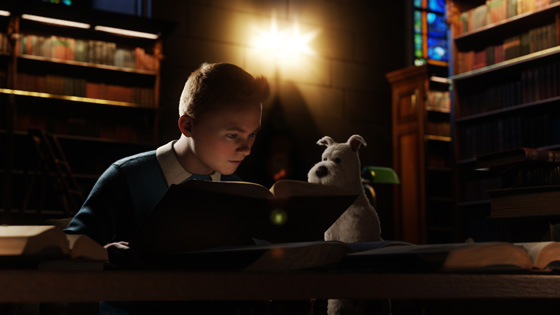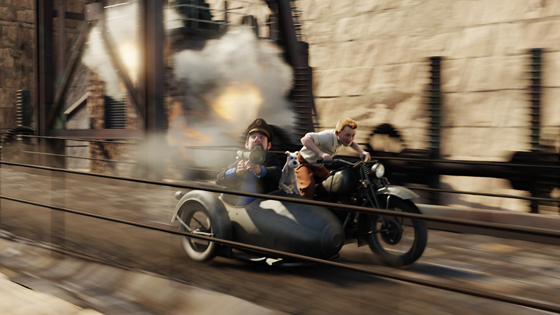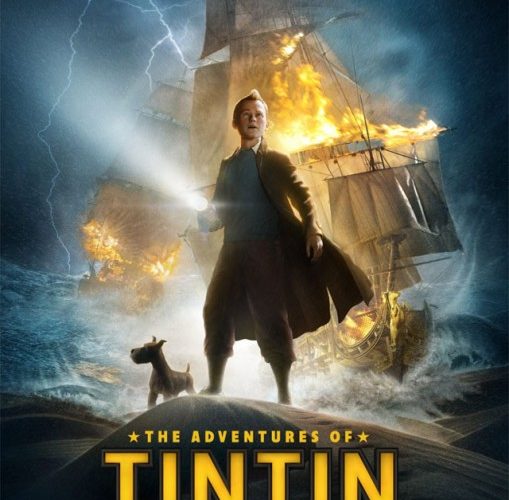
Considering I started conjuring images of an Indian sidekick named Hadji when first made aware of news Steven Spielberg and Peter Jackson were directing a The Adventures of Tintin trilogy, my knowledge and therefore enthusiasm in the project was somewhat lacking. Once I put my head straight, removed any “Johnny Quest” infusions, and feasted on what looked like a gorgeous animated motion capture world, my interest piqued more. It wasn’t until watching the silhouetted credit sequence—recalling Spielberg’s Catch Me If You Can—in Hergé‘s original comic style that the fun started to really sink in. Abstractly telling the entire story we were about to see, the adventurous shadows of Tintin and his Watson-like dog Snowy stumbled along with a glowing orb of light throughout the cast and crew list. And then the veil was lifted and the three-dimensional retooling arrived with as much charm and fun as the hand-drawings it was based upon.
Culled together from books nine, eleven, and twelve—”The Crab with the Golden Claws”, “The Secret of the Unicorn”, “Red Rackham’s Treasure” respectively—British superstar screenwriters Steven Moffat, Edgar Wright, and Joe Cornish have crafted a nonstop action film for the enjoyment of all ages. Any reservations I had as to why heavyweights like Spielberg and Jackson would bother disappeared once the suspenseful intrigue is uncovered less than ten minutes in. As the baby-faced sleuth journalist ambles about his town’s market to discover an elaborate replica of the 17th century war ship The Unicorn, its purchase embroils him in a centuries-old mystery. With an American hot on his trail saying he’s there to help and a nefariously goateed gentleman named Sakharine looking to take the vessel by any means necessary, Tintin and Snowy soon find themselves trapped on a ship named the Karaboudjan and the Indiana Jones type international adventure truly begins.
Besides introducing us to the titular gumshoe played with a flair for excitement by Jamie Bell, most of the other players are glimpsed in this market scene as well. Never letting a frame go without purpose, the filmmakers weave in and out of the crowded space as Snowy follows an unknown gentleman pick-pocketing the unsuspecting masses in a waltz of criminal activity—Toby Jones‘ Silk is a joy when caught. We also spy Inspectors Thompson (Simon Pegg) and Thomson (Nick Frost) shrouded by a newspaper disguise on the hunt—two bumbling gents who will forever let their friend Tintin do the work and reap as much credit in the process. And with the film’s breakneck speed continuously giving us something new to discover once the lull of a mystery’s end is found, every character enters and exits at opportune times to keep the world we’ve entered as complete as possible. Nobody is wasted and everyone plays his or her part.

While some of the best comedy comes from Thompson and Thomson’s brand of British humor—Pegg and Frost are pitch-perfect in their timing and wordplay—it’s the introduction of Captain Haddock (Andy Serkis) who steals the show. A paranoid drunkard whose last name makes him the integral piece to Tintin’s puzzle, the secret of the Unicorn rests somewhere within the broken synapses of his brain. With both captured by Sakharine (Daniel Craig) on his quest to find three ancient parchments holding the key to Red Rackham’s long lost pirate treasure, they must escape his oafish lackeys and do their best to reach Morocco to stop his villainy. The adventure therefore sprawls out from Tintin’s Belgium home to wide-open sea and North African deserts. With intricate chase scenes through land, air, and water, there is little time to take a breath as new clues are uncovered and the Tintin/Haddock/Snowy team gets closer and closer to the answers they seek.
A joy for adults and children alike, the script never panders or talks down to its audience, letting Snowy serve as our entry point to the plot. Tintin treats him with the utmost respect and always includes him in internal conversations for deduction. So, rather than giving us voiceover to the reporter’s thoughts, he speaks them aloud to his dog—and therefore us—as a way to hatch new plans and understand his next moves. Alongside these conversations is an elaborate flashback of Haddock’s grand-dad’s ultimate fight with Rackham told once the Captain is drunk enough to cajole his psyche into remembering the tale. Gimmicky devices or not, information is disseminated naturally throughout the fast pace without ever feeling forced. The speed with which it all comes may help in disguising how contrived things are, but kudos to them for tricking us all if that’s the case. In the end, I was consistently engaged throughout and always ready for the next exotic locale.
Chock-full of dryly-humorous gags as only the British could write effectively—look out for Snowy silently dragging a giant bone in the dessert and pay attention to Thompson and Thomson’s manic wordplay—and packaged by a huge leap in technology from the dead eyes of Zemeckis‘ Beowulf, The Adventures of Tintin is a surprisingly enjoyable romp. Bell infuses his hero with a perfect mix of innocence and ego while Serkis is a laugh riot with Haddock’s eccentricities and drunken actions. Craig’s villainous turn is a delight devoid of all redeemable qualities and his hoard of cronies serve as brilliant fodder to the many large scale action showcases. Between the fiery chaos of Sir Francis Haddock and Red Rackham’s stunning clash of battleships, a roller coaster ride chase through the streets of Bagghar, Morocco shot with sweeping camera movements to catch all the right angles, and a climactically destructive fight of cranes back in Europe, all will be at the edge of their seats.
Fans of Hergé’s work should become enchanted by the new look and welcome a return of the series’ timeless sensibilities. Hopefully newcomers like me will also be able to open their minds and let it take them to a world of magic and mystery. The British-ness of it all could distract those unfamiliar with the humor, but that makes it all the more important to bring your kids. Let them experience a new world of laughter because they’ll thank you decades later as they catch up on the brilliance of what men like Wright, Cornish, and Moffat have to offer.
The Adventures of Tintin is now in wide release.

